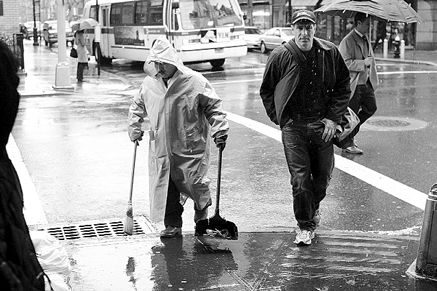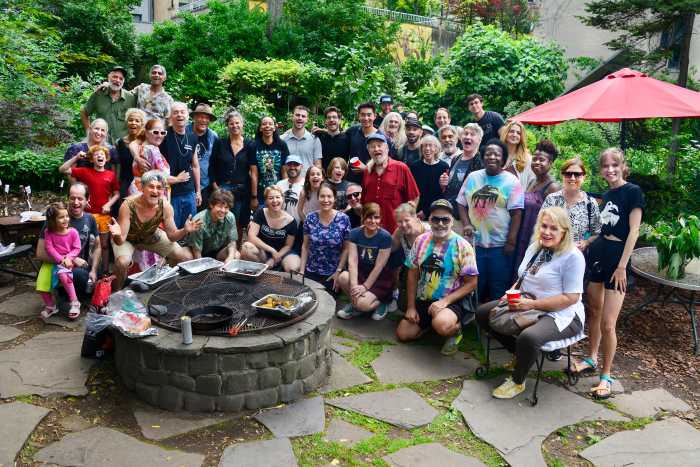By Lincoln Anderson
In the wake of Bob Rinaolo’s being forced to resign as chairperson of the Community Board 2 Business Committee because of a conflict of interest, the committee’s actions are continuing to raise eyebrows.
The latest questions concern the Business Committee, earlier this month, voting to deny a proposal by the Village Alliance business improvement district — also known as the “Eighth St. BID” — to expand its coverage area up Broadway to 10th St. and up University Pl. and Sixth Ave. to 12th St. or 13th St., depending on the side of the block.
What was puzzling about the committee’s vote was that no public opposition had been voiced against the plan — whereas 10 people turned out to support it — at the committee’s March 9 hearing. Similarly, at last Thursday’s full Board 2 meeting, two-dozen people came to show they approved of the expansion, while, again, no one from the audience spoke against it. The full board voted to overturn the committee’s resolution and passed a substitute resolution backing the Village Alliance’s plan.
Adding further intrigue was the insertion by the board’s district manager, Art Strickler, into board members’ information packets of an anonymous letter urging them to vote against the BID expansion.
The Business Committee members had voted 4 “no,” 2 “yes” and three abstentions (counted as “no” votes) against the Village Alliance plan. Don Lee and Rocio Sanz led the discussion at the committee against the BID’s plan, while the two votes in support of the BID were cast by Don MacPherson and Judy Paul.
Speaking to The Villager last week, Chinatown activist Lee cited a host of concerns he had about the BID’s growth, one of the main ones being that having a BID, in his belief, lessens city agencies’ response to the area.
“My input is not so much against BID’s,” he said, “but to highlight that we need to look at this at a micro level. If the city is not doing its job, let’s deal with it.”
Yet, at another point, Lee said BID’s get greater response from the city.
“When the BID calls, the city jumps,” he said. “We’re going to have a culture of haves and have-nots.” Also, Lee claimed, BID’s tend to make all areas look the same, attracting chain stores like Starbucks, the Gap and CVS, while harming mom-and-pop shops.
Maria Derr, who replaced Rinaolo as chairperson of the Business Committee in December after the borough president forced Rinaolo to step down over a conflict of interest, was out of town this week and couldn’t be reached for comment.
Sanz declined comment.
“Frankly, I didn’t agree with most of the members of the Business Committee,” MacPherson said, though not criticizing their position.
Rinaolo is still on the committee, which he headed for three and a half years. But he was not present at the committee’s March 9 meeting, as he is on a three-month break from the board in Florida. He did not return calls for comment. However, several board members, requesting anonymity, recalled Rinaolo once clashed with Honi Klein, the BID’s executive director.
In the mid-1990s, Klein played a role in a Board 2 committee’s vote denying Rinaolo’s request to add sidewalk cafe chairs outside his Garage restaurant on Seventh Ave. S., feeling the spot was ill suited because of a narrow sidewalk and subway grate. In turn, Rinaolo conducted a survey of Eighth St. merchants allegedly showing they opposed the Village Alliance’s plan to widen Eighth St.’s sidewalks.
In an apparent show of Rinaolo’s influence on the board and with Borough President C. Virginia Fields — who appoints the board members — Klein last year was not reappointed to Board 2.
At last week’s full board meeting, Lee reiterated his concerns about BID’s. However, several board members spoke strongly in favor of the BID and Klein.
“Some of us have philosophical issues with BIDs,” said Brad Hoylman. “But this is a very high-performing business-improvement district with overwhelming public support, with virtually no public opposition.”
MacPherson said Eighth St. has improved greatly from the 1960s when he was an N.Y.U. student.
“The way it looked then was really disgusting,” he said. “I have to say the way that area looks now is really immaculate.”
Attorney Arthur Schwartz, who last year represented Flatiron residents against the Union Sq. Partnership BID’s expansion plan, also spoke in favor of the Village Alliance plan. Although he has an office on University Pl., he’s a tenant, not a property owner, he noted.
“I don’t have an automatic response on BID’s,” Schwartz said. Because of the redevelopment of Union Sq., he said, “The area needs it. There’s more garbage, more crime problems, more sidewalk problems.”
Shirley Secunda and Ed Gold also made statements for the BID. The substitute resolution passed with eight “no” votes against, four of these being Business Committee members Derr, Sanz, Lee and John Diaz.
Afterwards, Lee told The Villager Rinaolo had not sought to influence his position.
The Business Committee resolution against the BID contained statements that were untrue, according to Klein as well as George Glatter, assistant commissioner of the city’s Department of Small Business Services, which oversees BID’s.
The resolution stated a BID “forces property owners to incur additional taxation…for essential services the city of New York already provides, i.e. sanitation, security, trees and lighting.”
But Klein said the 12-year-old BID provides many services the city doesn’t, such as clearing sidewalks of snow, graffiti removal, marketing the area, a booklet of discount coupons for use in local shops, information booths in the summer manned by four paid high school students, free walking tours by paid guides, holiday decorations, planters and weekly watering for 100 street trees. The BID employs two safety officers and five sanitation workers and also pays for a graffiti-removal team.
Assistant Commissioner Glatter said the anti-BID statements in the Business Committee’s resolution were mostly bogus.
For instance, Glatter explained, “By law, the city cannot reduce services to a BID area because there’s a BID there. Any reductions would come as city reductions.”
The committee resolution also stated that if a property owner failed to pay the BID assessment, his or her property would be subject to an “ ‘in-rem’ foreclosure action” by the city.
Wrong again, Glatter said, calling the resolution “misinformed.”
The anonymous letter distributed to board members also contained inaccuracies, according to Klein.
“The track record of this particular BID has been dismal,” the letter charged. “Other than spending over $400,000 per year removing graffiti and picking up garbage, this BID has done virtually nothing to improve business. Garbage pickup is available free of charge in New York City and let’s face it, how much graffiti can there possibly be?”
However, Klein noted that of the BID’s $509,000 annual budget, just 30 percent to 40 percent goes to sanitation and security.
The anonymous letter also took a shot at the BID by claiming there’s an “abundance” of empty stores on Eighth St. between Fifth and Sixth Aves. But Klein said the BID doesn’t have more vacant storefronts than areas bordering the BID.
As for performance, each quarterly review the BID always gets a 100 percent cleanliness rating, she said.
Asked if she was surprised at the opposition from the committee, Klein, recalling her time as a former community board member, said she couldn’t recall a similar case where a committee “took a position dramatically opposed to community opinion — especially when the support is overwhelming.”
Strickler wouldn’t say who gave him the anonymous letter, other than that it was “a responsible person.” He defended his putting it into the board members’ information packets.
“It was either somebody who was in the audience [the night of the full board meeting] or not present that night who I personally know to be a responsible person, who was afraid of retribution aand asked me if I could stick it in the board members’ packages.
“The board members could take it any way they wanted,” Strickler said. “Since it’s anonymous it could be a question mark — or it could be full of facts.”
As for who the letter writer was afraid of “retribution” from, Strickler said he didn’t know. “I wouldn’t comment on who it’s from,” Strickler said of the letter.
At the full board meeting, Smith left unresolved the issue of whether anonymous letters should be distributed.
However, speaking on Monday, Strickler said he’ll continue to insert them in board members’ packets as he sees fit.
“I won’t stick something in if it’s from a quote unquote ‘nut job,’ ” he said. “It’s a judgment call on my part.”
On Monday, Smith defended Strickler’s prerogative to circulate unsigned letters.
“What Arty did was perfectly ordinary,” Smith said. “He received a message intended for the members and he conveyed it to the members. As for the effect of the piece, I think it did nothing to promote the author’s viewpoint. Quite the opposite. Unsigned letters usually do boomerang.
“To the extent that such letters get ‘personal’ I’m against them,” Smith continued. “But signed or unsigned, we must not close our ears to anyone’s argument on an issue before the board. In determining what should and should not be distributed in the future, we must distinguish between a piece that is an ad hominem attack and a piece that merely represents a minority or unpopular view.”
As for the committee’s vote against the BID, Smith, in remarks to The Villager, claimed to understand the thinking behind it — though he didn’t agree with it.
“I believe that members opposing the extension felt the BID has been a burden, not a help, to the folks who actually rent stores on Eighth St.,” Smith said. “The public turnout at the full board was solidly pro-extension, but vendors themselves were not among the cheerleaders. Witnesses before a committee may or may not represent all the significant points of view on an issue. Members respect each witness’s point of view but they also take into consideration their own experience and insight in coming to a position.
“Personally,” Smith said, “I voted for the extension. As a pedestrian I like Honi’s work. She made Eighth St. wider, cleaner, more comfy.”






































